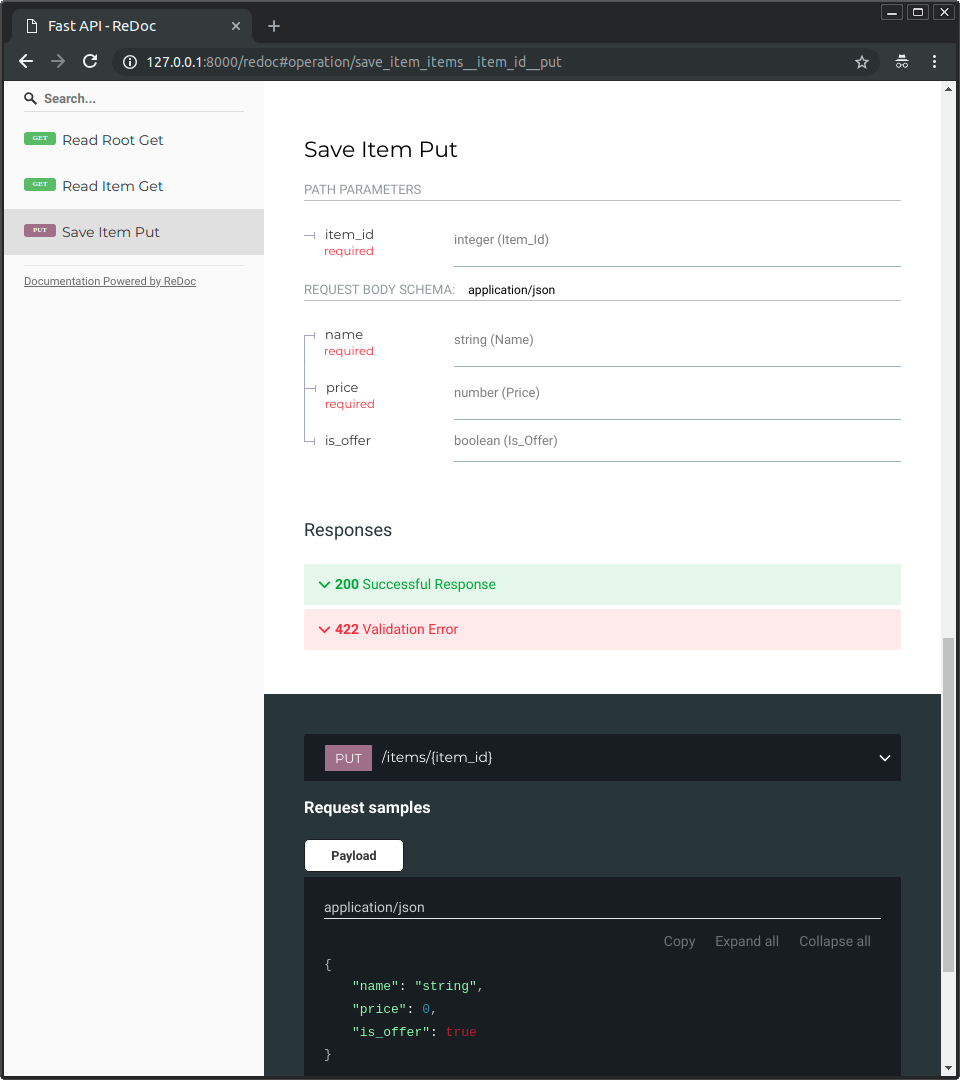- Sort Score
- Result 10 results
- Languages All
Results 1 - 10 of 20 for etc (0.14 sec)
-
docs/en/docs/tutorial/first-steps.md
Plain Text - Registered: Sun May 05 07:19:11 GMT 2024 - Last Modified: Thu May 02 22:37:31 GMT 2024 - 12K bytes - Viewed (0) -
docs/en/docs/deployment/concepts.md
Plain Text - Registered: Sun May 05 07:19:11 GMT 2024 - Last Modified: Thu May 02 22:37:31 GMT 2024 - 18K bytes - Viewed (0) -
docs/en/docs/deployment/manually.md
``` </div> That would work for most of the cases. 😎 You could use that command for example to start your **FastAPI** app in a container, in a server, etc. ## ASGI Servers Let's go a little deeper into the details.
Plain Text - Registered: Sun May 05 07:19:11 GMT 2024 - Last Modified: Thu May 02 22:37:31 GMT 2024 - 9.2K bytes - Viewed (0) -
docs/es/docs/index.md
 ### Resumen En resumen, declaras los tipos de parámetros, body, etc. **una vez** como parámetros de la función. Lo haces con tipos modernos estándar de Python. No tienes que aprender una sintaxis nueva, los métodos o clases de una library específica, etc. Solo **Python** estándar. Por ejemplo, para un `int`: ```Python item_id: int ```
Plain Text - Registered: Sun May 05 07:19:11 GMT 2024 - Last Modified: Mon Apr 29 05:18:04 GMT 2024 - 19K bytes - Viewed (0) -
docs/en/docs/features.md
* API keys in: * Headers. * Query parameters. * Cookies, etc. Plus all the security features from Starlette (including **session cookies**). All built as reusable tools and components that are easy to integrate with your systems, data stores, relational and NoSQL databases, etc. ### Dependency InjectionPlain Text - Registered: Sun May 05 07:19:11 GMT 2024 - Last Modified: Thu May 02 22:37:31 GMT 2024 - 9.3K bytes - Viewed (0) -
docs/en/docs/advanced/openapi-callbacks.md
In this case, you could want to document how that external API *should* look like. What *path operation* it should have, what body it should expect, what response it should return, etc. ## An app with callbacks Let's see all this with an example. Imagine you develop an app that allows creating invoices. These invoices will have an `id`, `title` (optional), `customer`, and `total`.
Plain Text - Registered: Sun May 05 07:19:11 GMT 2024 - Last Modified: Thu May 02 22:37:31 GMT 2024 - 7.7K bytes - Viewed (0) -
docs/en/docs/advanced/openapi-webhooks.md
## Documenting webhooks with **FastAPI** and OpenAPI With **FastAPI**, using OpenAPI, you can define the names of these webhooks, the types of HTTP operations that your app can send (e.g. `POST`, `PUT`, etc.) and the request **bodies** that your app would send. This can make it a lot easier for your users to **implement their APIs** to receive your **webhook** requests, they might even be able to autogenerate some of their own API code.
Plain Text - Registered: Sun May 05 07:19:11 GMT 2024 - Last Modified: Thu May 02 22:37:31 GMT 2024 - 2.8K bytes - Viewed (0) -
docs/en/docs/release-notes.md
Because `Annotated` is **standard Python**, you still get all the **benefits** from editors and tools, like **autocompletion**, **inline errors**, etc.
Plain Text - Registered: Sun May 05 07:19:11 GMT 2024 - Last Modified: Fri May 03 23:25:42 GMT 2024 - 388.1K bytes - Viewed (1) -
docs/hu/docs/index.md
* Fájlok. * Kimeneti adatok <abbr title=" más néven: serialization, parsing, marshalling">átváltása</abbr>: Python adatok is típusokról hálózati adatokká: * válts át Python típusokat (`str`, `int`, `float`, `bool`, `list`, etc). * `datetime` csak objektumokat. * `UUID` objektumokat. * Adatbázis modelleket. * ...És sok mást. * Automatikus interaktív dokumentáció, beleértve két alternatív dokumentációt is: * Swagger UI.
Plain Text - Registered: Sun May 05 07:19:11 GMT 2024 - Last Modified: Mon Apr 29 05:18:04 GMT 2024 - 20.2K bytes - Viewed (0) -
docs/en/docs/deployment/docker.md
Linux containers run using the same Linux kernel of the host (machine, virtual machine, cloud server, etc). This just means that they are very lightweight (compared to full virtual machines emulating an entire operating system).
Plain Text - Registered: Sun May 05 07:19:11 GMT 2024 - Last Modified: Thu May 02 22:37:31 GMT 2024 - 34K bytes - Viewed (0)